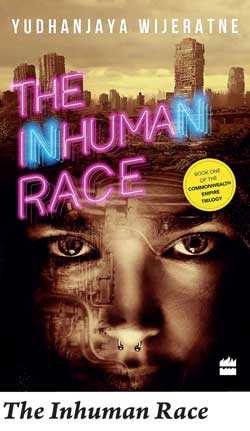Monday Feb 16, 2026
Monday Feb 16, 2026
Saturday, 4 May 2019 00:10 - - {{hitsCtrl.values.hits}}
 The Inhuman Race introduces us to the Colombo of an alternate future. A Colombo where the British Empire carries on in uneasy co-existence with the Chinese. Colombo itself is a wasteland, the seat of power is now Kandy.
The Inhuman Race introduces us to the Colombo of an alternate future. A Colombo where the British Empire carries on in uneasy co-existence with the Chinese. Colombo itself is a wasteland, the seat of power is now Kandy.
Much of what we know now has changed and yet much of what we know now remains the same: political greed and excess, petty bureaucracy, the pursuit of social status, wealth, job security. Times may change, people don’t. This is one of the many lessons very gently underscored in the book
'
For such a short book it is cleverly layered and rewards multiple readings. I’ve read it three times (once just to strikethrough all the typos, because they annoyed me so much! Harper Collins India really needs to get a copyeditor on board).
The first reading was a fast one because the story is well paced and compelling and you really want to find out what happens next. It’s part action adventure, part social satire, part hard-science lesson- all the things that make for really good science fiction (for me at least).
The second reading was slower because I really wanted to appreciate the technique that went into the book. There’s a discipline of structure and form that is more usually found in so-called literary fiction than in popular fiction.
The book itself can be roughly segmented into four; the initial storyline centres around the charismatic character of the Silent Girl, who speaks only through phrases she plays on an old stereo. Her friendship with the Pissa and their subsequent journey in search of a better life take up most of the first half of the story.
Philosophy and science come more heavily into play in the second half of the book. The heroine in the second half, Dr. Kushlani De Almeida, is our guide through the socio-political dynamics of a future Sri Lanka, through her we are also forced to consider the meaning of what it is to be human, the nature of justice, the fact that we will ultimately have to bear the unavoidable consequences of our actions.
 The philosophy in the book is subtle and nuanced and heavily influenced by the classics and classical values. Reading the book the second time I was struck by how those value are cleverly reflected through the story and its characters.
The philosophy in the book is subtle and nuanced and heavily influenced by the classics and classical values. Reading the book the second time I was struck by how those value are cleverly reflected through the story and its characters.
The friendship and journey of Silent Girl and Pissa is funny and sensitive and charming- their journey embodies the appreciation of the goodness and beauty of life despite its hardships. We cheer for them every step of the way.
Dr Kushlani de Almeida battles fiercely for truth and justice and brings the reader along with her in the fight. “If God made man in His image, and if we made (robots) in our image, by inference are they not also built in God’s image?”
The themes of the book have echoes of Asimov, of Shelley’s Frankenstein, it’s an intelligent story that’s also fun. And for a book of less than 200 pages, that’s impressive.
The Inhuman Race is the first book in Yudhanjaya Wijeratne’s Commonwealth Empire Trilogy. I can’t wait to read the rest.
– Review by Thilani Samaringha